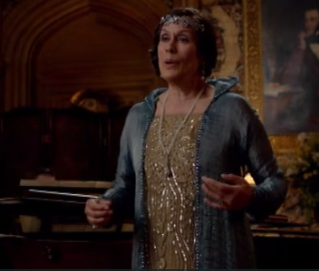by Michael Accinno
Dame Nellie Melba’s performance of “Donde lieta usci” on Downton Abbey—performed by Dame Kiri Te Kanawa—thus drew upon the complex web of cultural meanings linking Mimi to Melba. On the one hand, the aria presents Mimi at the height of her fragility and vulnerability. Weakened by consumption at this point in the opera, she bids her lover Rodolfo a plaintive farewell after his jealousy has pushed their relationship to a breaking point. On the other hand, the aria invites us to hear and reflect upon Melba herself as a cultural icon—as an intriguing Australian outsider who used her considerable talents to reach the heights of social and artistic power in London, Paris, and New York.
At a lavish house party thrown by the Grantham clan, Melba’s appearance promotes the notion that her music has the power to overcome Downton’s entrenched class- and gender-based hierarchies. After Lord Grantham and his butler Carson conspire to send a food tray to Melba’s room (Carson: “An Australian singer? Eating with her ladyship?”), Lady Grantham admonishes both men and forces her husband to sit next to Melba at dinner. Although at first reticent (“What does one say to a singer?”), Grantham quickly bonds with Melba over their shared taste for Haut-Brion. At Melba’s ensuing recital, featuring Dvořák’s “Songs My Mother Taught Me” and two Puccini arias (“O mio babbino caro” and “Donde lieta usci”), Lady Grantham takes special care to invite Downton’s servants and wait staff to attend the event. When Melba takes the stage, her singing appears to deliver Lady Grantham her hoped-for “special moment.” But in a shocking twist, music’s capacity to edify and to uplift is promptly shattered.
As Melba begins to sing “Donde lieta”—to be sure, it is Mimi’s most poignant moment of vulnerability—the on–screen action cuts away to a violent confrontation unfolding downstairs between Lady’s maid Anna Bates and a visiting valet, Mr. Greene. Since his arrival, Greene has unabashedly flirted with Anna despite the jealous protestations of her husband. Alone with Anna for the first time, he forces himself upon her. In lieu of witnessing the most visceral moments of the rape, we see Mr. Bates listening to Melba’s performance. Like Mimi’s Rodolfo, Bates’s jealousy dissipates and as he is driven to serene visions of his beloved Anna, he whispers: “I wonder what she’s doing. Maybe she’s fallen asleep.”
Although the scene has generated a steady stream of outrage from fans and critics of the show, there has been little discussion of the way in which Melba and her most famous role contribute a disturbing sonic counterpoint to the sequence of events. Building upon a well–established cinematic trope in which opera’s aesthetic beauty is juxtaposed with on–screen physical violence, Melba’s recital both embraces and rejects the capacity of music to empower women and to effect social change.
Michael Accinno is a Ph.D. candidate in musicology at the University of California, Davis, and assistant editor of Musicology Now.
Note: Listening to Downton Abbey (part 1) is available HERE.On 8 June 1926, a distinguished crowd gathered at London’s Covent Garden for Dame Nellie Melba’s farewell performance as Mimi in Puccini’s La bohème. Like many of the “Melba nights” of decades past, the performance left many in the audience—the King and Queen among them—captivated. (A reviewer boasted that a recording of the evening would “mark a new epoch in the power of the gramophone.”) For both Melba and her London audiences, the role had long held special significance. In her famed appearances with Enrico Caruso, Melba had helped Puccini’s opera achieve a lasting place in the canon. Fittingly, when the Royal Opera House reopened after World War I, the company’s opening night honors belonged to Melba and Bohème. Even in her own death, Melba was linked inextricably to Puccini’s Bohemian heroine; her headstone bears Mimi’s famous line from the third act: “Addio, senza rancor”—“Goodbye, without resentment.”
Dame Nellie Melba’s performance of “Donde lieta usci” on Downton Abbey—performed by Dame Kiri Te Kanawa—thus drew upon the complex web of cultural meanings linking Mimi to Melba. On the one hand, the aria presents Mimi at the height of her fragility and vulnerability. Weakened by consumption at this point in the opera, she bids her lover Rodolfo a plaintive farewell after his jealousy has pushed their relationship to a breaking point. On the other hand, the aria invites us to hear and reflect upon Melba herself as a cultural icon—as an intriguing Australian outsider who used her considerable talents to reach the heights of social and artistic power in London, Paris, and New York.
| Nellie Melba as Desdemona in Verdi's Otello, 1924. Source: Nellie Melba, Memories and Melodies, p. 321. |
 |
| Kiri Te Kanawa plays Nellie Melba on Downton Abbey. Source: ITV. |
Although the scene has generated a steady stream of outrage from fans and critics of the show, there has been little discussion of the way in which Melba and her most famous role contribute a disturbing sonic counterpoint to the sequence of events. Building upon a well–established cinematic trope in which opera’s aesthetic beauty is juxtaposed with on–screen physical violence, Melba’s recital both embraces and rejects the capacity of music to empower women and to effect social change.
Michael Accinno is a Ph.D. candidate in musicology at the University of California, Davis, and assistant editor of Musicology Now.